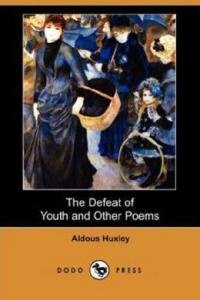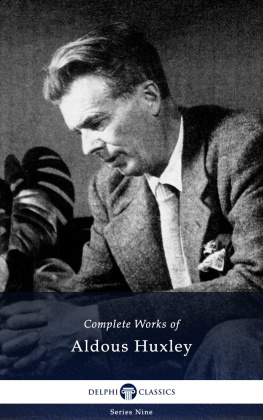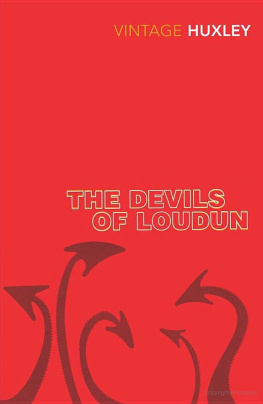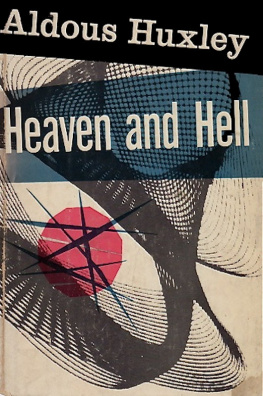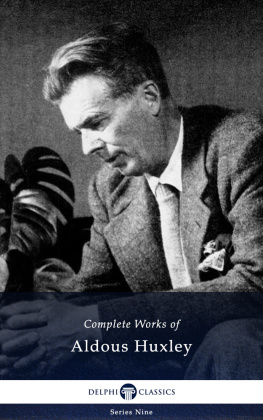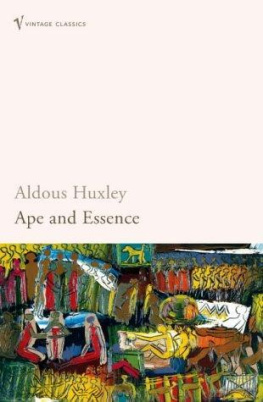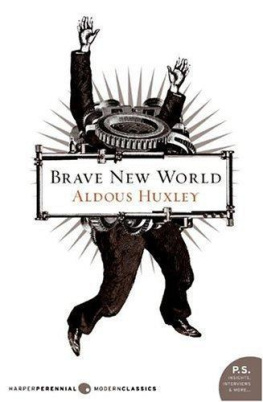Oldos Haksli - The Defeat of Youth and Other Poems
Here you can read online Oldos Haksli - The Defeat of Youth and Other Poems full text of the book (entire story) in english for free. Download pdf and epub, get meaning, cover and reviews about this ebook. year: 2014, publisher: epubBooks Classics, genre: Art. Description of the work, (preface) as well as reviews are available. Best literature library LitArk.com created for fans of good reading and offers a wide selection of genres:
Romance novel
Science fiction
Adventure
Detective
Science
History
Home and family
Prose
Art
Politics
Computer
Non-fiction
Religion
Business
Children
Humor
Choose a favorite category and find really read worthwhile books. Enjoy immersion in the world of imagination, feel the emotions of the characters or learn something new for yourself, make an fascinating discovery.
- Book:The Defeat of Youth and Other Poems
- Author:
- Publisher:epubBooks Classics
- Genre:
- Year:2014
- Rating:4 / 5
- Favourites:Add to favourites
- Your mark:
- 80
- 1
- 2
- 3
- 4
- 5
The Defeat of Youth and Other Poems: summary, description and annotation
We offer to read an annotation, description, summary or preface (depends on what the author of the book "The Defeat of Youth and Other Poems" wrote himself). If you haven't found the necessary information about the book — write in the comments, we will try to find it.
The Defeat of Youth and Other Poems — read online for free the complete book (whole text) full work
Below is the text of the book, divided by pages. System saving the place of the last page read, allows you to conveniently read the book "The Defeat of Youth and Other Poems" online for free, without having to search again every time where you left off. Put a bookmark, and you can go to the page where you finished reading at any time.
Font size:
Interval:
Bookmark:
The Defeat of Youth and Other Poems
Aldous Huxley
The Defeat of Youth
I. Under the Trees.
There had been phantoms, paleremembered shapes
Of this and this occasion, sisterly
In their resemblances, each effigy
Crowned with the same bright hair above the nape's
White rounded firmness, and each body alert
With such swift loveliness, that very rest
Seemed a poised movement: phantoms that impressed
But a faint influence and could bless or hurt
No more than dreams. And these ghost things were she;
For formless still, without identity,
Not one she seemed, not clear, but many and dim.
One face among the legions of the street,
Indifferent mystery, she was for him
Something still uncreated, incomplete.
II.
Bright windy sunshine and the shadow of cloud
Quicken the heavy summer to new birth
Of life and motion on the drowsing earth;
The huge elms stir, till all the air is loud
With their awakening from the muffled sleep
Of long hot days. And on the wavering line
That marks the alternate ebb of shade and shine,
Under the trees, a little group is deep
In laughing talk. The shadow as it flows
Across them dims the lustre of a rose,
Quenches the bright clear gold of hair, the green
Of a girl's dress, and life seems faint. The light
Swings back, and in the rose a fire is seen,
Gold hair's aflame and green grows emerald bright.
III.
She leans, and there is laughter in the face
She turns towards him; and it seems a door
Suddenly opened on some desolate place
With a burst of light and music. What before
Was hidden shines in loveliness revealed.
Now first he sees her beautiful, and knows
That he must love her; and the doom is sealed
Of all his happiness and all the woes
That shall be born of pregnant years hereafter.
The swift poise of a head, a flutter of laughter
And love flows in on him, its vastness pent
Within his narrow life: the pain it brings,
Boundless; for love is infinite discontent
With the poor lonely life of transient things.
IV.
Men see their god, an immanence divine,
Smile through the curve of flesh or moulded clay,
In bare ploughed lands that go sloping away
To meet the sky in one clean exquisite line.
Out of the shortseen dawns of ecstasy
They draw new beauty, whence new thoughts are born
And in their turn conceive, as grains of corn
Germ and create new life and endlessly
Shall live creating. Out of earthly seeds
Springs the aerial flower. One spirit proceeds
Through change, the same in body and in soul
The spirit of life and love that triumphs still
In its slow struggle towards some faroff goal
Through lust and death and the bitterness of will.
V.
One spirit it is that stirs the fathomless deep
Of human minds, that shakes the elms in storm,
That sings in passionate music, or on warm
Still evenings bosoms forth the tufted sleep
Of thistleseeds that wait a travelling wind.
One spirit shapes the subtle rhythms of thought
And the long thundering seas; the soul is wrought
Of one stuff with the bodymatter and mind
Woven together in so close a mesh
That flowers may blossom into a song, that flesh
May strangely teach the loveliest holiest things
To watching spirits. Truth is brought to birth
Not in some vacant heaven: its beauty springs
From the dear bosom of material earth.
VI. IN THE HAYLOFT.
The darkness in the loft is sweet and warm
With the stored hay darkness intensified
By one bright shaft that enters through the wide
Tall doors from under fringes of a storm
Which makes the doomed sun brighter. On the hay,
Perched mountainhigh they sit, and silently
Watch the motes dance and look at the dark sky
And mark how heartbreakingly far away
And yet how close and clear the distance seems,
While all at hand is cloudbrightness of dreams
Unrealisable, yet seen so clear,
So only just beyond the dark. They wait,
Scarce knowing what they wait for, half in fear;
Expectance draws the curtain from their fate.
VII.
The silence of the storm weighs heavily
On their strained spirits: sometimes one will say
Some trivial thing as though to ward away
Mysterious powers, that imminently lie
In wait, with the strong exorcising grace
Of everyday's futility. Desire
Becomes upon a sudden a crystal fire,
Defined and hard:If he could kiss her face,
Could kiss her hair! As if by chance, her hand
Brushes on his Ah, can she understand?
Or is she pedestalled above the touch
Of his desire? He wonders: dare he seek
From her that little, that infinitely much?
And suddenly she kissed him on the cheek.
VIII. MOUNTAINS.
A stronger gust catches the cloud and twists
A spindle of rifted darkness through its heart,
A gash in the damp grey, which, thrust apart,
Reveals black depths a moment. Then the mists
Shut down again; a white uneasy sea
Heaves round the climbers and beneath their feet.
He strains on upwards through the wind and sleet,
Poised, or swift moving, or laboriously
Lifting his weight. And if he should let go,
What would he find down there, down there below
The curtain of the mist? What would he find
Beyond the dim and stifling now and here,
Beneath the unsettled turmoil of his mind?
Oh, there were nameless depths: he shrank with fear.
IX.
The hills more glorious in their coat of snow
Rise all around him, in the valleys run
Bright streams, and there are lakes that catch the sun,
And sunlit fields of emerald far below
That seem alive with inward light. In smoke
The far horizons fade; and there is peace
On everything, a sense of blessed release
From wilful strife. Like some prophetic cloak
The spirit of the mountains has descended
On all the world, and its unrest is ended.
Even the sea, glimpsed far away, seems still,
Hushed to a silver peace its storm and strife.
Mountains of vision, calm above fate and will,
You hold the promise of the freer life.
X. IN THE LITTLE ROOM.
London unfurls its incensecoloured dusk
Before the panes, rich but a while ago
With the charred gold and the red emberglow
Of dying sunset. Houses quit the husk
Of secrecy, which, through the day, returns
A blank to all enquiry: but at nights
The cheerfulness of fire and lamp invites
The darkness inward, curious of what burns
With such a coloured life when all is dead
The daylight world outside, with overhead
White clouds, and where we walk, the blaze
Of wet and sunlit streets, shops and the stream
Of glittering trafficall that the nights erase,
Colour and speed, surviving but in dream.
XI.
Outside the dusk, but in the little room
All is alive with light, which brightly glints
On curving cup or the stiff folds of chintz,
Evoking its own whiteness. Shadows loom,
Bulging and black, upon the walls, where hang
Rich coloured plates of beauties that appeal
Less to the sense of sight than to the feel,
So moistly satin are their breasts. A pang,
Almost of pain, runs through him when he sees
Hanging, a homeless marvel, next to these,
The silken breastplate of a mandarin,
Centuries dead, which he had given her.
Exquisite miracle, when men could spin
Jay's wing and belly of the kingfisher!
XII.
In silence and as though expectantly
She crouches at his feet, while he caresses
His lightdrawn fingers with the touch of tresses
Sleeked round her head, closebanded lustrously,
Save where at nape and temple the smooth brown
Sleaves out into a pale transparent mist
Of hair and tangled light. So to exist,
Poised 'twixt the deep of thought where spirits drown
Font size:
Interval:
Bookmark:
Similar books «The Defeat of Youth and Other Poems»
Look at similar books to The Defeat of Youth and Other Poems. We have selected literature similar in name and meaning in the hope of providing readers with more options to find new, interesting, not yet read works.
Discussion, reviews of the book The Defeat of Youth and Other Poems and just readers' own opinions. Leave your comments, write what you think about the work, its meaning or the main characters. Specify what exactly you liked and what you didn't like, and why you think so.

